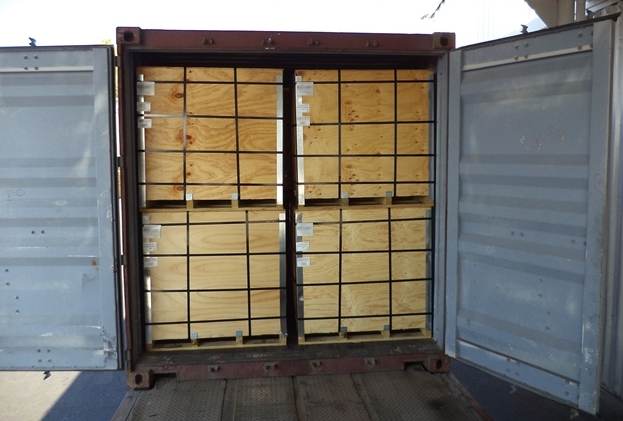Although conversations are occurring within the North American (and global) industry relative to the current acute pallet shortages, the US United Fresh Produce Association believes that many do not yet realize the factors impacting the situation and the potential scope of the issue, including the availability of produce to consumers. The Association says due to spiked lumber costs, the price of pallets is up by as much as 400 percent compared to pre-pandemic; in an open letter (May 19, 2021), it details and comments the main aspects of this shortage likely to slow down fresh as well as processed products trade and exert new pressure on the cost of transport and goods.
According to the association, “multitude of issues are impacting pallet availability including:
 Efforts of wholesalers, distributors and retailers to ensure sufficient inventory of nonperishables given previous pandemic-related impacts.
Efforts of wholesalers, distributors and retailers to ensure sufficient inventory of nonperishables given previous pandemic-related impacts. The availability of lumber to repair and build new pallets.
The availability of lumber to repair and build new pallets. The escalating price of lumber when it is available.
The escalating price of lumber when it is available. Non-perishable inventory dwell time increase.
Non-perishable inventory dwell time increase. Lack of available trucks to relocate pallets.
 The lack of pallets is adding stress to a supply chain that is already facing significant challenges which include a lack of available trucks and shipping containers, ongoing labour challenges, fluctuating fuel costs, pandemic-related challenges and a pending shortage of resin used to make reusable containers and pallets. At this time expectations are that the pallet shortage will continue for months, perhaps for the balance of 2021 — all at a time when many North American produce items are just beginning seasonal harvests and shipments.
The lack of pallets is adding stress to a supply chain that is already facing significant challenges which include a lack of available trucks and shipping containers, ongoing labour challenges, fluctuating fuel costs, pandemic-related challenges and a pending shortage of resin used to make reusable containers and pallets. At this time expectations are that the pallet shortage will continue for months, perhaps for the balance of 2021 — all at a time when many North American produce items are just beginning seasonal harvests and shipments.
To give a sample of the scope of the issue, we’ve compiled the following information:
 The shortage of lumber and wood products has increased the cost of raw lumber 200% to 350% and is making the cost of wood pallets increase incrementally.
The shortage of lumber and wood products has increased the cost of raw lumber 200% to 350% and is making the cost of wood pallets increase incrementally. In one example, it was noted that over the past few weeks, pallet costs have increased more than 400%, IF the pallets are even available, and often they are not.
In one example, it was noted that over the past few weeks, pallet costs have increased more than 400%, IF the pallets are even available, and often they are not. One farmer was told by one pallet supplier that they are not taking any new customers due to an inability to fill even existing customer demand.
One farmer was told by one pallet supplier that they are not taking any new customers due to an inability to fill even existing customer demand. Companies are forced to bring pallets from other jurisdictions thereby incurring border and transportation costs.
Companies are forced to bring pallets from other jurisdictions thereby incurring border and transportation costs. Pallets are being held in-house due to delayed and cancelled orders from pallet services, leading to higher storage charges and increased congestion within operations.
Pallets are being held in-house due to delayed and cancelled orders from pallet services, leading to higher storage charges and increased congestion within operations.
Working together, the supply chain must balance organizational goals relative to overall availability of goods with availability of food. If there is not a concerted effort across the supply chain to ensure pallet availability for shipment of produce, there is little doubt that it will be very difficult, if not impossible, for the grower/shipper community to meet buyer, and ultimately consumer, demand for produce. Simultaneously, growers and shippers are working hard to remain compliant with pallet requirement specifications where they can, but this is proving challenging. Temporary modifications or exceptions to pallet requirements, as long as they do not jeopardize safety, would prove advantageous until this pallet shortage is resolved.
 This letter is intended, in part, to act as a catalyst for industry awareness and should be shared with all stakeholders to ensure a consistent understanding of the issue and to encourage discussions and efforts towards a path forward. All partners in the supply chain should have regular conversations with their pallet suppliers to understand the situation and pallet inventories/availability.
This letter is intended, in part, to act as a catalyst for industry awareness and should be shared with all stakeholders to ensure a consistent understanding of the issue and to encourage discussions and efforts towards a path forward. All partners in the supply chain should have regular conversations with their pallet suppliers to understand the situation and pallet inventories/availability.
We welcome the opportunity to work collaboratively with all parties within the supply chain to mitigate the impacts of the current shortages and will reach out to stakeholders to identify a path forward that provides solutions to this increasingly disruptive threat and enables the continued flow of goods.”
Some complementary data:
In the U.S., about 700 million pallets are produced and recycled each year. Around 4 billion wooden and plastic pallets are currently in use. Nearly 40 percent of all hardwood produced in the U.S. goes into pallet production.
 In a study last year, Penn State researchers studied pallets from cradle-to-grave and looked at nine different factors, from ozone layer depletion and ecotoxicity, to global warming and non-renewable energy. They found that wooden pallets are more environmentally friendly than plastic pallets.
In a study last year, Penn State researchers studied pallets from cradle-to-grave and looked at nine different factors, from ozone layer depletion and ecotoxicity, to global warming and non-renewable energy. They found that wooden pallets are more environmentally friendly than plastic pallets.Molded plastic pallets last longer, but are derived from petroleum or natural gas products, which greatly increases their carbon footprint.
They also found that conventional and radio frequency heat treatment for wooden pallets is more sustainable than methyl bromide fumigation treatment.
Source: unitedfresh.org, foodmanufacturing.com




 This letter is intended, in part, to act as a catalyst for industry awareness and should be shared with all stakeholders to ensure a consistent understanding of the issue and to encourage discussions and efforts towards a path forward. All partners in the supply chain should have regular conversations with their pallet suppliers to understand the situation and pallet inventories/availability.
This letter is intended, in part, to act as a catalyst for industry awareness and should be shared with all stakeholders to ensure a consistent understanding of the issue and to encourage discussions and efforts towards a path forward. All partners in the supply chain should have regular conversations with their pallet suppliers to understand the situation and pallet inventories/availability.



























